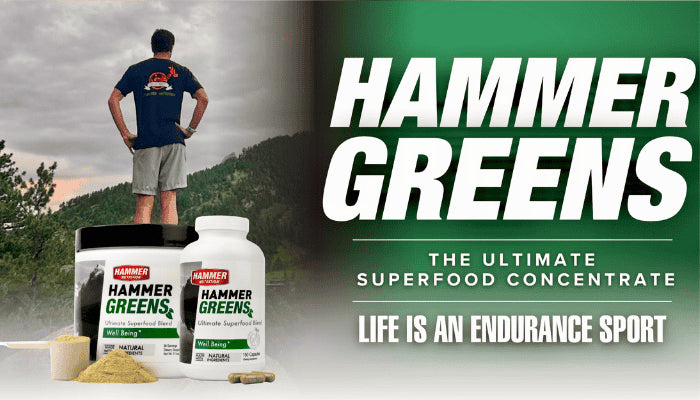
By Steve Born
Which protein is best for use before, during, and after exercise has been a subject of much debate. We recommend a combination of both soy and whey protein, used at separate times, to provide the most comprehensive support for an endurance athlete's diet. We believe that Hammer Whey Protein is the premier protein for recovery and enhanced immune system function, while Hammer Soy Protein is ideal for fulfilling protein requirements prior to and during endurance exercise.
That doesn't mean using soy protein for recovery purposes would be "wrong" or in any way harmful. For optimal benefits, though, you'll not find a better protein for recovery and immune system boosting than whey protein, in particular whey protein isolate. For exercise-specific benefits it's hard to top soy, which is the main reason we use it in both Sustained Energy and Perpetuem.
The benefits of soy protein
Because it has less potential than whey protein for producing ammonia, a primary cause of muscle fatigue, soy protein is best used prior to and during exercise. That alone would make soy the preferential choice for use during exercise, but soy has yet more benefits.
Soy protein has a unique amino acid profile. This composition adds to its attractiveness as the ideal protein to use during endurance exercise. Although not as high in concentration as whey protein, soy protein still provides a substantial amount of branched chain amino acids (BCAAs), which your body readily converts for energy production. BCAAs and glutamic acid, another amino acid found in significant quantity in soy protein, also aid in the replenishing of glutamine within the body, and without the risk of ammonia production caused by orally ingested glutamine, an amino acid usually added to whey protein. Soy has high amounts of both alanine and histidine, which is part of the beta-alanyl l-histidine dipeptide known as carnosine, renowned for its antioxidant and acid buffering benefits. Soy protein also has a high level of aspartic acid, which plays an important role in energy production via the Krebs cycle. Lastly, soy protein has higher levels of phenylalanine than does whey, which may aid in maintaining alertness during extreme ultra distance races.

In addition, for general health benefits it's hard to beat soy. Soy protein contains multitudes of healthenhancing phytochemicals. Scientific research has established many connections between soy consumption and lower rates of certain cancers, notably breast, prostate, stomach, lung, and colon. Comparing cancer rates for the U.S. with those of Asian countries (which have soy rich diets) shows some remarkable differences. For instance, Japan has one-fourth the rate of breast cancer and one-fifth the rate of prostate cancer. In China, medical researchers linked the consumption of soymilk to a 50% risk reduction for stomach cancer. Studies done in Hong Kong suggest that daily soy consumption was a primary factor in a 50% reduction in the incidence of lung cancer.
Ideal for women and for men over 40, soy protein contains several phytochemicals, which are believed to be beneficial for helping to support cardiovascular health, optimal cholesterol levels, osteoporosis prevention, and possibly cancer prevention. Hammer Soy is a great way to help you meet your daily protein requirements. As with all the Hammer Nutrition fuels, Hammer Soy is made only from the highest quality naturally derived ingredients. It contains absolutely no GMO (genetically modified organism) soy and has no added sugars or artificial colors, flavors, or preservatives.
Add Hammer Soy to juices, smoothies, or other soy-based drinks to make a satisfying and healthy meal. It's also a great addition when making pancake or muffin batter, adding high quality, all-vegetable protein to the mixture. Read more here.
The benefits of whey protein
For enhancing the recovery process, whey protein has no peer. Whey protein has the highest biological value (BV) of any protein source. BV rates the availability of the protein once ingested, and whey is arguably the most rapidly absorbed protein, exactly what you want post-workout. Whey protein's amino acid profile contains the highest percentage of essential amino acids, 25% of which are the BCAAs leucine, isoleucine, and valine, the most important for muscle tissue repair. Whey is also a rich source of two other important amino acids, methionine and cysteine, which stimulate the natural production of glutathione, one of the body's most powerful antioxidants and a major player in maintaining a strong immune system. Glutathione also supports healthy liver function.

Hammer Whey
Each scoop of Hammer Whey contains 100% micro-filtered whey protein isolate, with no added fillers, sugar, or artificial sweeteners or flavoring. The key word here is isolate. Manufacturers supply two forms of whey, isolate and concentrate. Whey protein concentrate contains anywhere from 70% to 80% actual protein (and, sadly, sometimes even less), the remainder being fat and lactose. Isolate, on the other hand, contains 90% - 97+% protein, with little, if any, lactose or fat, making it the purest form of whey protein available. Because isolate contains almost no lactose, even those with lactose intolerance find it an easily digestible protein source. We use only isolate in our whey-containing products, Hammer Whey and Recoverite.
In addition, each scoop of Hammer Whey contains a whopping 6 grams of glutamine, a remarkable amino acid. Space limits all that could be written regarding the benefits of this extraordinary, multi-beneficial amino acid, but needless to say, it's essential for endurance athletes in supporting enhanced recovery and immune system function. Glutamine is the most abundant amino acid in your muscles. Intense exercise severely depletes glutamine, which makes supplementation so important. Glutamine plays a significant role in the glycogen synthesis process, and along with the branched chain amino acids, glutamine helps repair and rebuild muscle tissue. In addition, glutamine has also been shown to help raise endogenous levels of glutathione, which is intimately involved in immune system health. Glutamine contributes to growth hormone release and is a key component for intestinal health.
Read more about Hammer Whey Protein here.
How much do you need?
How much protein do endurance athletes need to consume? Numerous studies have demonstrated that endurance athletes in heavy training need more protein than recreational athletes do. Once it was believed that 1/2 gram of protein per pound (about .5 kilogram) of body weight-75 grams for a 150-lb (68 kg) person-per day was sufficient. Today's standards, however, would increase that figure to about 100-112 grams (2/3 to 3/4 grams of protein per pound of body weight).
To find out how much you require, multiply your weight in kilograms by 1.4 to 1.7, depending on your exercise intensity. This gives you the amount of protein (in grams) that you should consume on a daily basis. (To convert from pounds to kilograms, divide by 2.2). Thus, a 165-pound (75 kg) athlete in high training mode should consume about 128 grams of protein daily.
Bottom Line:
Although athletes don't typically give protein the same kind of "status" as carbohydrates, there can be no doubt that obtaining adequate amounts of protein is crucial for endurance athletes. I hope you will use this information to help you determine what kind of protein to use and how much, and start reaping the athletic performance and overall health benefits that whey and soy proteins can provide!









